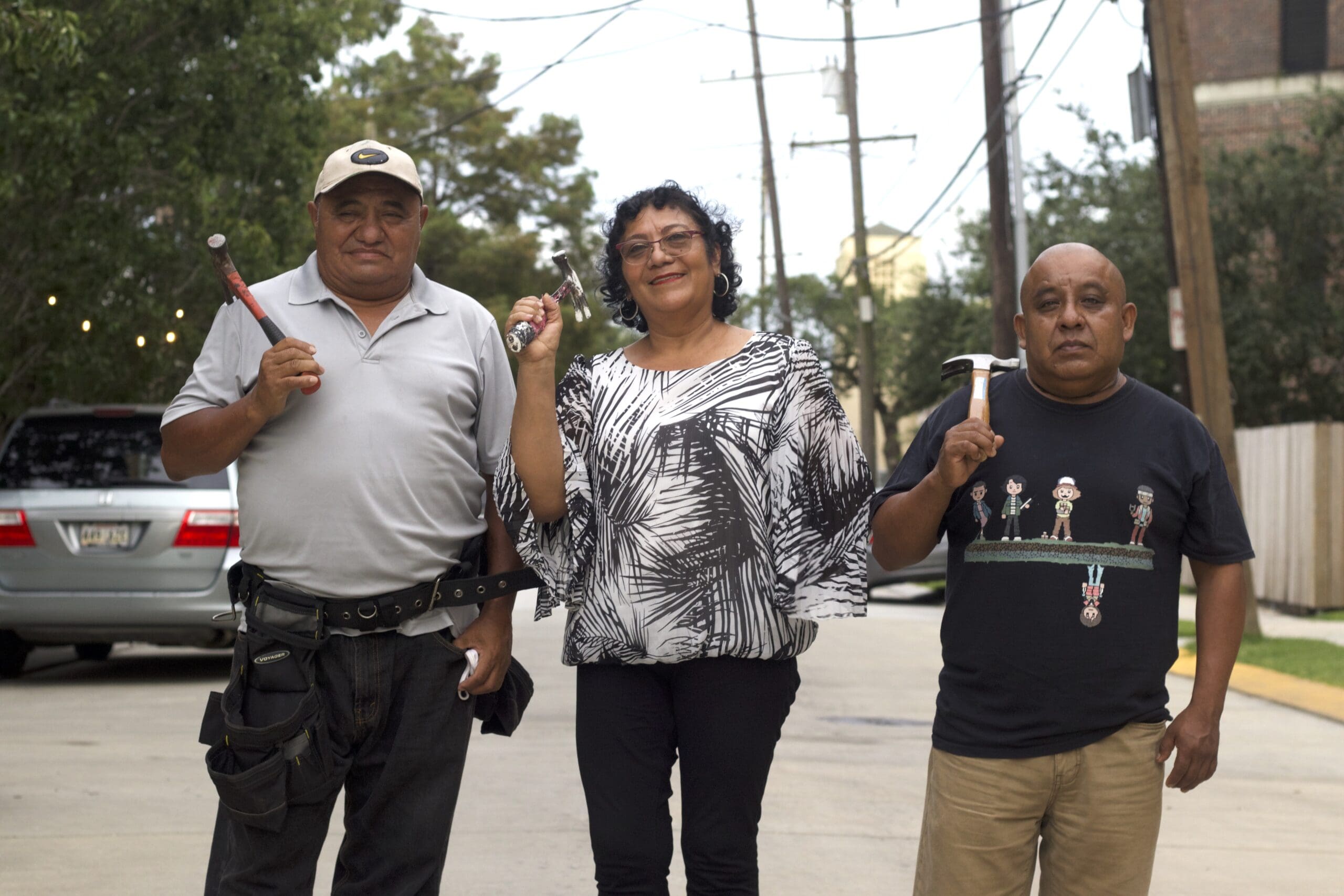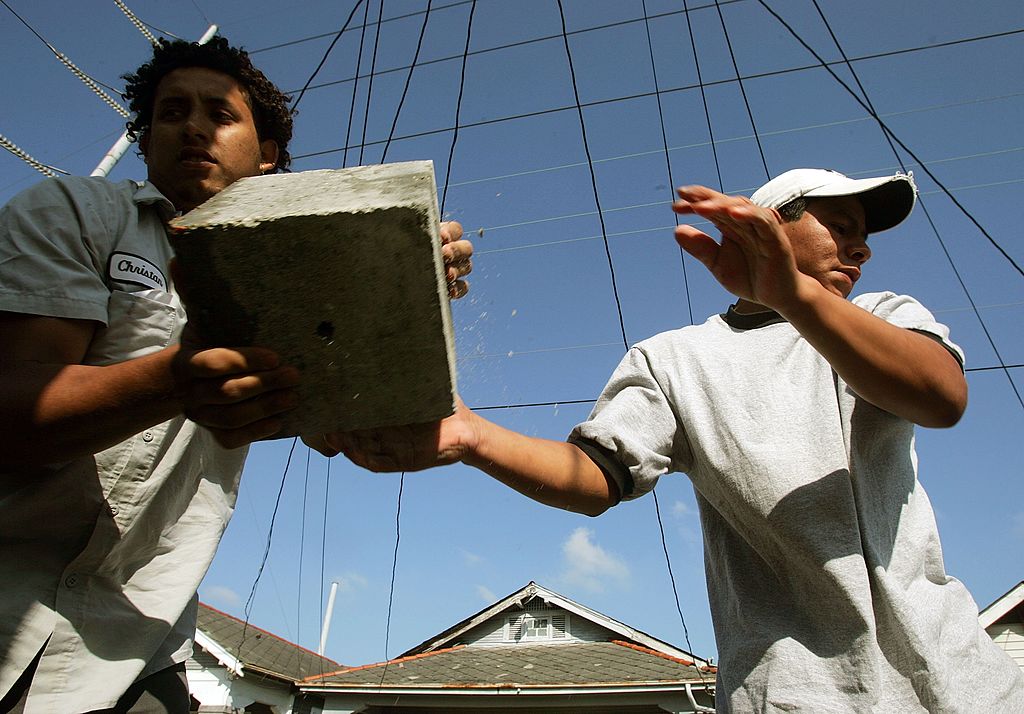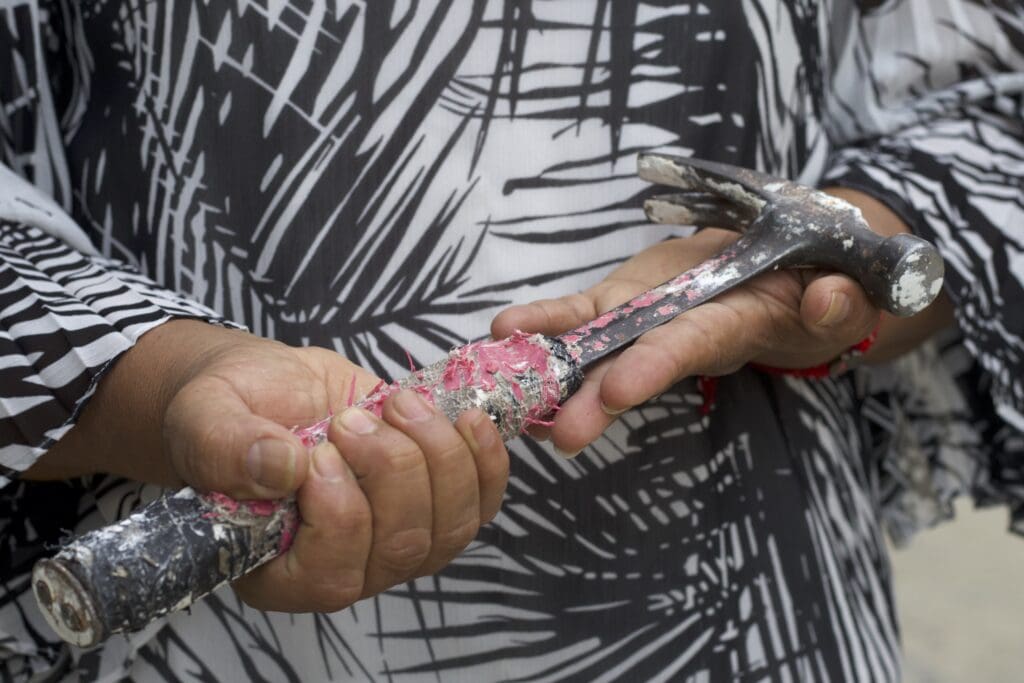Latest News
A Labor Day Homage to New Orleans’ Rebuilders
Three migrant workers recall the adversity they faced when they arrived to resurrect New Orleans. Many workers who came in Hurricane Katrina’s wake still face those conditions today.

Editor’s Note: It’s worth remembering, as we head into the Labor Day weekend and as Hurricane Katrina’s 15th anniversary observances fade away, that much of New Orleans was rebuilt on the backs of Latino immigrants. As Frances Madeson reports, those seldom thanked laborers performed around the clock under harsh physical and economic conditions, and were often the victims of wage theft.
The evening before Marco and Laura were forecast to roar through the Gulf of Mexico towards New Orleans in a one-two hurricane punch, Santos Alvarado had peered the length of his street for suspicious vehicles before leaving his house to be interviewed for this article.
“I am undocumented,” Alvarado says, “and you always have to watch over your shoulder.”
If not for the red tide algae bloom that brought an abrupt end to fishing in the waters on the southern coast of Honduras in 1998, Alvarado might still be at home there with his first family today. Compounding matters, just at the time he lost his livelihood, his 6 year old son got the nib of a pencil eraser stuck inside his nasal cavity. The doctors from the Cuban medical brigade who examined him in Honduras said extracting it would require surgery, and soon, if the boy’s sense of smell was to be saved from the infection causing his nostril to hemorrhage and putrefy.
“The laborers helped us get back on our feet and culturally changed our community. When we look back, we owe a debt of gratitude.”
— Former New Orleans city council president Arnie Fielkow
Alvarado’s wages for cutting coffee couldn’t cover the 10,000 lempiras he needed to pay for the operation (about $400). He would earn that money over time in Houston, then found more work in Dallas. Eventually he traveled and worked with two brothers and a brother-in-law, until, in January 2006, they reached the post-Katrina landscape of New Orleans.
“I had heard about the devastation, but when I saw the destruction and the conditions, I wanted to cry as if I had lived here. Everything was in ruins,” he says. “There were no people, no lights, and there was a foul smell throughout the city.”

April, 2006: Laborers from Mexico and Honduras help put New Orleans back together again. (Photo: Mario Tama/Getty Images)
By then his family back home was almost entirely dependent on his earnings for survival, a situation that would not improve with the 2008 global economic crash and has extended to this day. Before COVID, he would send $300-$400 a month, sometimes more if they especially needed something.
He was an early arrival among the tens of thousands of Latino workers from Central America and Mexico recruited by operators or friends. The levee failures caused flooding in 80 percent of the city, and the work to clear the debris was steady for more than two years.
“These houses were like ghost houses — branches everywhere, dead pets you had to take out. A lot of times there was no PPE, and you had to do it. We didn’t know our rights.”
— Alfredo Carrera
Sleeping in a tent camp in City Park, he began cleaning schools, colleges, municipal and other governmental buildings, stripping the walls and floors to the metal studs, which other workers disinfected with bleach. It was all hard labor, but one job, dismantling a school kitchen, was so perturbing that talking about it all these years later still makes him squirm.
“There was so much rotten meat; there were vegetables that had rotted, and we had to take all that out,” he says. “There were four of us, and we would take turns because we couldn’t bear the stench, 30 minutes each person.”
He’s testified about the incident before the Louisiana state Legislature and tells that story when challenged by locals who say that he came here to take their jobs:
“When we were in that kitchen, I would have loved for somebody to come and say, ‘You’re taking my job.’ And I would’ve said, ‘Of course, please take it back.’”
* * *
Olga Tiburcios arrived in New Orleans in December 2005 to primitive living conditions she could scarcely believe.
“I was in a house of all men, and since I didn’t have a room, I locked myself in the laundry room,” she says, “and slept on the floor.”
“The guy hit me with a bottle. He threw it at me when I asked for him to pay me the money he owed me. He said, ‘If you don’t leave right now I’m going to call the police.’”
— Olga Tiburcios
A sewing teacher and seamstress in Mexico, she got a demolition job on her very first day in New Orleans. She had to be a quick study, picking up new skills as she worked. Until she became more experienced and connected, she was sometimes preyed upon by bosses.
“The contractor, he obligated me to cook for everybody in the morning and dinner when I came home,” Tiburcios says. “I was so tired but he made me.” Her extra work would keep her on her feet until 11 p.m. only to be up at 4 a.m. and back at the worksite by 6.
She left that crew for another, she explains, “Because the guy hit me with a bottle. He threw it at me when I asked for him to pay me the money he owed me. He said, ‘If you don’t leave right now I’m going to call the police.’”
It wasn’t her only instance of wage theft. “I was owed thousands of dollars,” she says. “I lost all of it. I would search for the contractors at the addresses they’d given me, but they couldn’t be found.” Alvarado, too, says he and his brothers were swindled out of $12,000.
* * *
Oliver Thomas, radio host of WBOK’s The Good Morning Show, was the president of the New Orleans City Council at that time.
“I remember an incident with a guy who said his name was Ernie,” Thomas says. “Ernie showed up at my house with six or seven other guys and said, ‘Man, people told me to come ask you to help.’ And I said, ‘Help with what?’ He said, ‘Man, these contractors, they’re supposed to be paying us $18 an hour but they’re only paying us $10.” Thomas offered to assist them in reporting it, but they felt it was too risky because of their immigration status. This was before the Congreso de Jornaleros (Congress of Day Laborers) was established to organize the workers to fight rampant wage theft.
“Sometimes, you had four feet of standing water. You had to pick up the carpet, the floor, the furniture, the heaviest things, the most toxic things—that was our work.”
— Alfredo Carrera
Starting in 2009 then-city council president Arnie Fielkow attempted to get a wage theft bill passed (Fielkow is now head of the Jewish Federation of Greater New Orleans). Ultimately, he co-sponsored a resolution on April 7, 2011, for the purpose of “applauding and supporting the efforts of the Judges, Constable and Clerk of First City Court in addressing the issue of wage theft in New Orleans, and pledging to continue to work with all parties to seek additional effective instruments to address wage theft in New Orleans.” The resolution was adopted.
Fielkow says the post-Katrina infusion of migrants both helped restore and refresh New Orleans as a global city. “The laborers helped us get back on our feet and culturally changed our community. When we look back, we owe a debt of gratitude.”
Thomas also remembers street theft with neighborhood guys robbing migrants and disparaging them as “walking ATMs.”
“They’d find out their paydays and worksites and go to the job and follow them,” he explains.
Thomas says there were conversations in which other tensions between local Blacks and Latino migrant workers surfaced — “real talk,” but straight out of the divide and conquer playbook.
“One young African American man from Central City said, ‘Hey man, I can’t walk down the streets of my city without being harassed and without the police stopping me, and I’m legal.’”
* * *
Alfredo Carrera came from Mexico in 2006, and so far his best day in the United States was his first, because he made it in.
“I thought, okay, I’ll go for one year,” Carrera says, “and here I am 14 years later.”

A monument honoring Latino migrants who rebuilt New Orleans after Hurricane Katrina. (Photo: Jason Kerzinski)
In the immediate post-Katrina period, he experienced feelings of displacement similar to those expressed by the locals.
“You suffered a little bit and would get sad and sentimental when the owners were crying for their homes and things that they had lost,” he says. “We kept working but with our hearts so heavy and maybe like how they were feeling.”
They began to rebuild the city, sustained by meals delivered by the Red Cross, or occasionally from the one Chinese restaurant open in mid-City, or by hot-dogs a guy sold out of his car. They lined up outside the one Winn Dixie grocery store that was open, but with limited hours. It was hardly enough food to meet the caloric demands of all the laborers clearing heavy, waterlogged debris.
“Sometimes, you had four feet of standing water,” Carrera says. “You had to pick up the carpet, the floor, the furniture, the heaviest things, the most toxic things—that was our work. We didn’t have gloves, we didn’t have masks. When you went into a house that had been enclosed for two months, the mold…these houses were like spook houses, like ghost houses, branches everywhere, dead pets you had to take out. A lot of times there was no PPE, and you had to do it. Everyone was coughing. We didn’t know our rights.”
He says Congreso’s focus shifted toward police and Immigration and Customs Enforcement (ICE) abuse and harassment. Between 500 and 600 people routinely crowded their monthly organizing meetings, frantic to stop the deportation raids in 2013.
“Many people disappeared,” Carrera says. “We never found out where they went. When we asked the police they said we handed them over to immigration. When we asked immigration they said no, they never came here. They were terrorizing our communities.”
Congreso mounted pressure and kept it up until the policy was changed via a federal consent decree—a key protection was that the sheriff could no longer share information with ICE or allow officials to come into his jail. Carrera says the fight, which was relentless, was not just for themselves. “If the program had been fruitful, ICE was going to implement it nationwide.”
More recently, the Congreso has demonstrated in support of the families of the three workers killed last October in the Hard Rock Hotel collapse. The precarious wreck in the heart of the city has stood for 10 months as a monument to all that’s unfair for undocumented workers. The worker who exposed the hazardous conditions that led to the collapse has been deported, and the cadavers of the fallen were retrieved just last month after decomposing at the site.
The Congreso continues to meet virtually during the pandemic, tracking who’s sick from COVID-19 and those who have died.
“In truth, nobody wants to go to the hospital,” Alvarado says. “We make our own home remedies. We only go to the hospital when we have problems breathing. We’re worried a lot, because you hear the news and we know that that virus is very dangerous.”
Migrants have been excluded from unemployment benefits and stimulus aid, depending on parish of residence. It’s been a scramble to cobble together food for survival from mutual aid and charitable donations; there is hunger and fear of hunger, and anguish for the families back home.
“I haven’t been able to send a single dollar back home for months now. It hurts to see our families suffer,” says Alvarado, “to see that they’re missing rice or shoes, the most essential things. If we had different conditions in our countries, if we could work there, we wouldn’t be here.”
“I don’t want you to help me, I want you to understand me,” Carrera says even more bluntly.
“We’re raising our voices. We know we’re not going to see the victory, but our children might. We are teaching them to be good for the world and continue our struggle. This is what we’ve learned based on what we’ve lived.”
Copyright 2020 Capital & Main

-

 Column - State of InequalityJanuary 22, 2026
Column - State of InequalityJanuary 22, 2026On Eve of Strike, Kaiser Nurses Sound Alarm on Patient Care
-

 Latest NewsJanuary 16, 2026
Latest NewsJanuary 16, 2026Homes That Survived the 2025 L.A. Fires Are Still Contaminated
-

 The SlickJanuary 20, 2026
The SlickJanuary 20, 2026The Rio Grande Was Once an Inviting River. It’s Now a Militarized Border.
-

 Latest NewsJanuary 21, 2026
Latest NewsJanuary 21, 2026Honduran Grandfather Who Died in ICE Custody Told Family He’d Felt Ill For Weeks
-

 The SlickJanuary 19, 2026
The SlickJanuary 19, 2026Seven Years on, New Mexico Still Hasn’t Codified Governor’s Climate Goals
-

 Latest NewsJanuary 22, 2026
Latest NewsJanuary 22, 2026‘A Fraudulent Scheme’: New Mexico Sues Texas Oil Companies for Walking Away From Their Leaking Wells
-

 The SlickJanuary 23, 2026
The SlickJanuary 23, 2026Yes, the Energy Transition Is Coming. But ‘Probably Not’ in Our Lifetime.
-

 The SlickJanuary 27, 2026
The SlickJanuary 27, 2026The One Big Beautiful Prediction: The Energy Transition Is Still Alive


